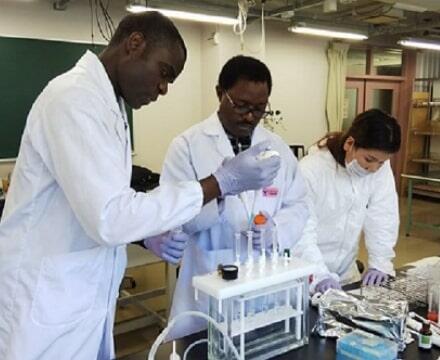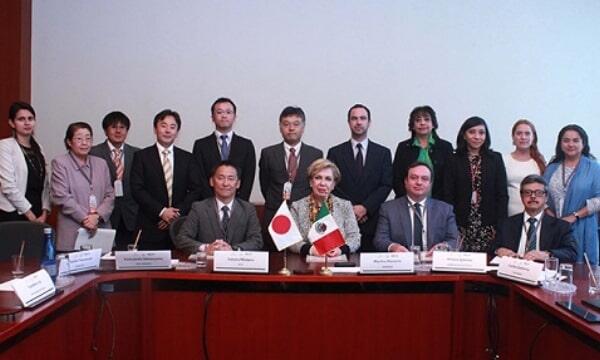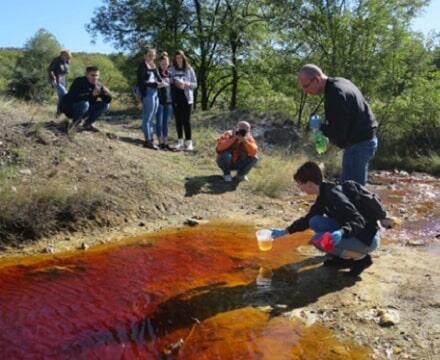About SATREPS
SATREPS
Science and Technology Research Partnership for Sustainable Development
SATREPS is a Japanese government program that promotes international joint research aimed at solving global issues.
The SATREPS program is promoting international joint research with the goal of resolving global issues as one aspect of "science and technology diplomacy," which connects science and technology with diplomacy for the mutual advancement of both.
Worldwide attention directed toward the Sustainable Development Goals (SDGs) illustrates the increasing complexity of global issues such as climate change, food problems, natural disasters, and infectious disease. Developing countries that are more susceptible to their impacts are being placed in a difficult situation. To resolve these issues will require scientific and technological innovation, putting the results of research to use in society, developing human resources, and improving research capacity across national boundaries.
In the SATREPS program, researchers from Japan and developing countries are together tackling issues in the four fields of Environment and Energy, Bioresources, Disaster Prevention and Mitigation, and Infectious Disease Control*, discovering new knowledge and technologies with real-world applications in light of local needs, and thus contributing to the international community that is working toward sustainable development.
* Since FY2015, projects relating to Infectious Disease Control have been transferred to the Japan Agency for Medical Research and Development (AMED). Please see the AMED website for details of the Infectious Disease Control research field.
Global issues
Issues that affect more than a single country or region, and cannot be resolved without international collaboration.
International Cooperation to Address Global Issues, Advance Science, Develop Capacity
- International Cooperation
Enhancing international cooperation in science and technology between Japan and developing countries
- Addressing Global Issues and Advancing Science
Acquiring new knowledge and technology that lead to the resolution of global issues and the advance of science and technology, and through this process, creating innovations
- Capacity Development
Boosting self-reliant research and development capacity in developing countries through international joint research, constructing sustainable research systems that can contribute to resolving issues, coordinating networking between researchers, and training future human resources in developing countries and in Japan
〜Utilize Research Outcomes〜
-
Capacity Development
SATREPS joins and coordinates functions, activities, and capabilities that were once separate, using scientific research potential as a mediator for developmental diplomacy.Boosting self-reliant research and development capacity in developing countries through international joint research, constructing sustainable research systems that can contribute to resolving issues, coordinating networking between researchers, and training future human resources in developing countries and in Japan.
-
Utilization of research outcomes
The research projects should lead to future social and economic benefits, achieved by using newly obtained knowledge and technology to enhance government services or to develop products that can be deployed in the market.
SATREPS joins and coordinates functions, activities, and capabilities that were once separate, using scientific research potential as a mediator for developmental diplomacy
SATREPS joins and coordinates functions, activities, and capabilities that were once separate, using scientific research potential as a mediator for developmental diplomacy.
It is expected that the promotion of international joint research activities under this program will enable Japanese research institutions to conduct research more effectively in fields and targets where it is advantageous to implement the research in developing countries. Meanwhile, it is hoped that for research institutions in the developing countries, the establishment of research center facilities and the development of human resources through joint research activities will make it possible to develop self-reliant, sustainable research systems.
-
Science and technology
Promoting science and technology, encouraging innovation
-
International cooperation
ODA, development assistance
-
Meeting global needs
Resolving global issues and contributing to the science and technology community
-
Meeting local needs
Capacity development to address issues emerging as local needs in developing countries
-
Japan's capabilities
World-leading technology, proven research capacity
Soft power
-
Developing countries' capabilities
Direct experience, knowledge, and data needed for research on global issues
Potential to contribute to the global economy through new markets and industries
JST and JICA work together to fund research projects
Overall research and development management of the international joint research is handled jointly by JST, which has expertise in funding research projects at research institutions in Japan, and JICA, which has expertise in technical cooperation in developing countries.
JST will provide financial support to the Japanese research institutions for the project activities in Japan and JICA will provide financial support to the research institutions in the ODA recipient countries within the framework of technical cooperation projects*
* As JICA supports the partner country with ODA under the technical cooperation framework, the country is required to depend on its own efforts. Consequently, the local institution's costs incurred for the project (labor cost, office rent, consumables by local researchers, operation and maintenance of equipment provided, domestic transportation fees for local researchers, conference attendance allowances, and other miscellaneous costs) should in principle be covered by its own country.
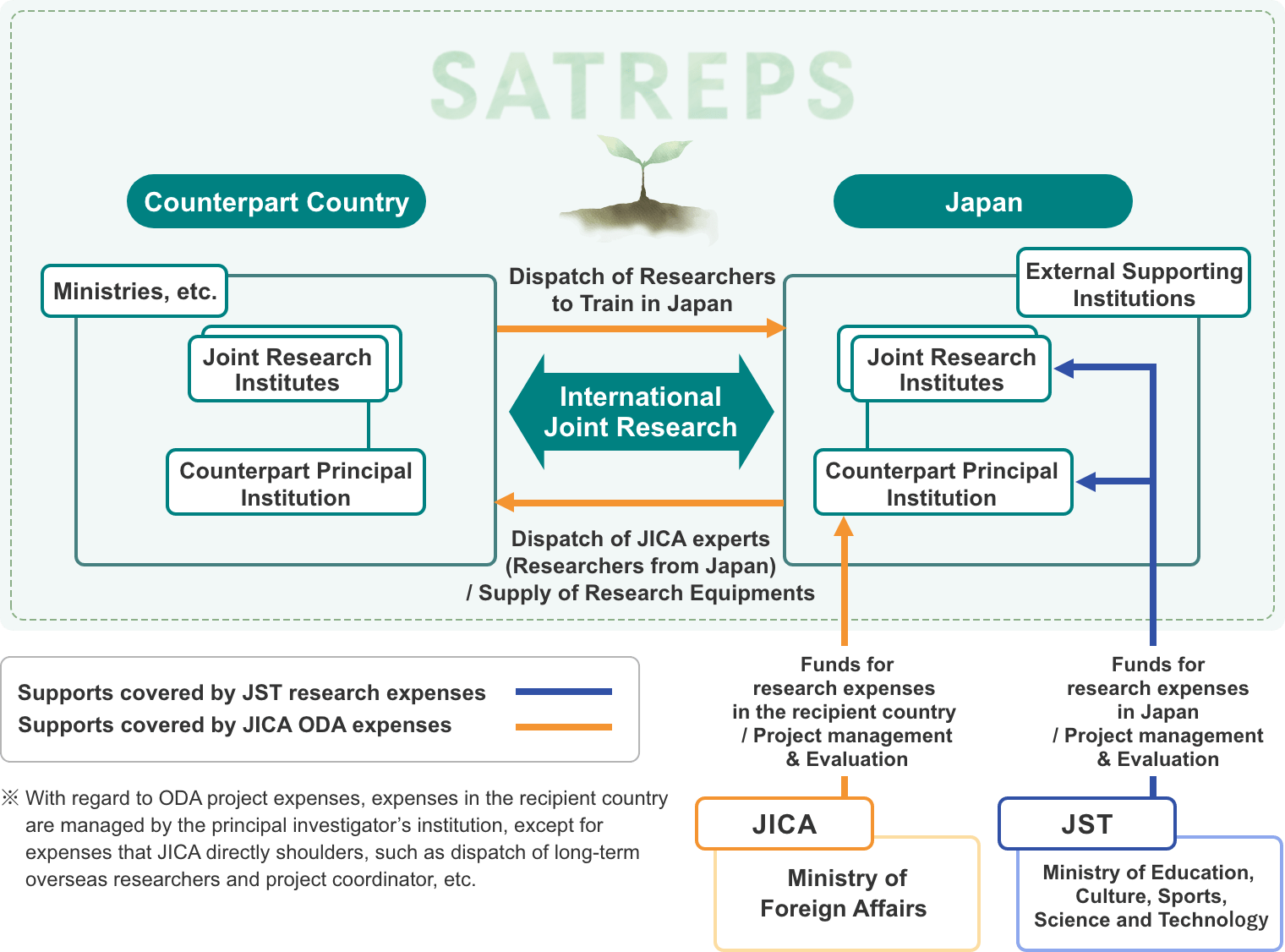
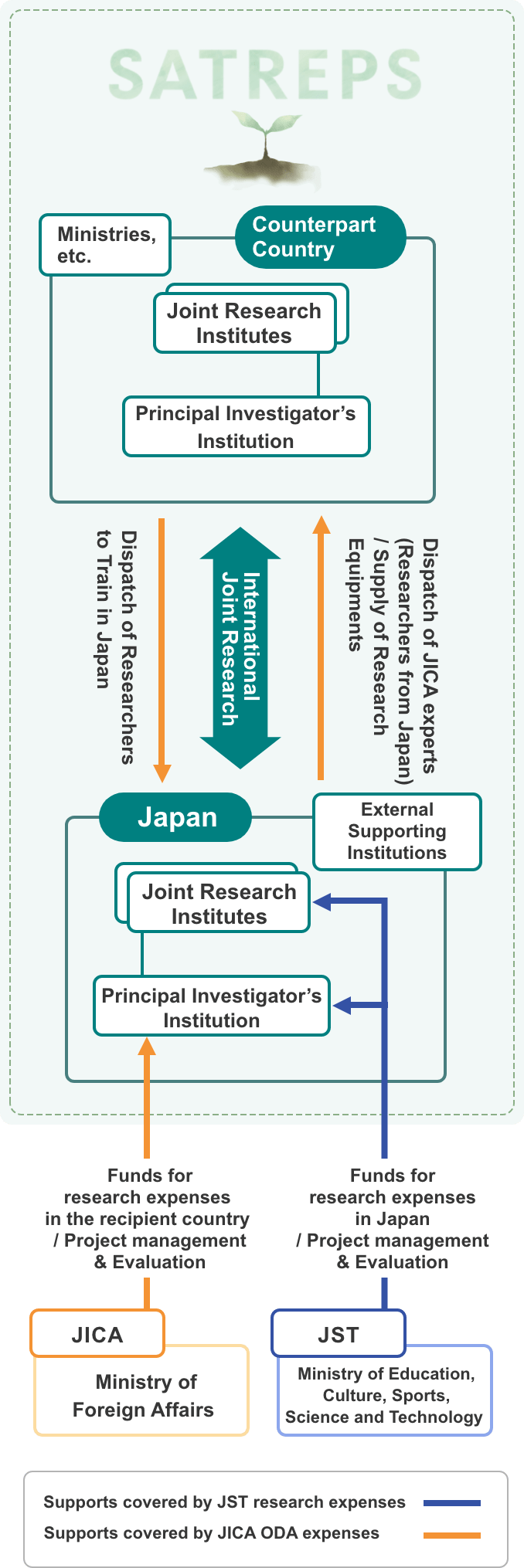
※ With regard to ODA project expenses, expenses in the recipient country are managed by the principal investigator's institution, except for expenses that JICA directly shoulders, such as dispatch of long-term overseas researchers and project coordinator, etc.
Project budget
Approx. 100 million yen per project per year
Funding split: JST: Approx. 35 million yen
Funding split: JICA: Approx. 60 million yen
Projects selected
Since 2008, 193 projects in total have been conducted in 60 countries.
| Area | Number of eligible countries | Number of projects |
|---|---|---|
| Asia | 14 countries | 106 projects |
| Africa | 21 countries | 45 projects |
| Latin America/Caribbean | 10 countries | 27 projects |
| Other regions | 15 countries | 15 projects |
※ This includes projects in the area of Infectious Disease Control that were supported by JST until 2014. (Since FY2015 this research area has been supported by AMED.)
A total of 66 international joint research projects in 36 countries are currently in progress as SATREPS projects in Environment and Energy, Bioresources, and Disaster Prevention and Mitigation (as of April 17, 2025).
About SATREPS
- About SATREPS
- Research Fields and Areas
- Program Director (PD) and Research Supervisors
- About SDGs
- Public Relations
Contact Us
Japan Science and Technology Agency (JST)
Department of International Affairs
SATREPS Group
TEL : +81-3-5214-8085






